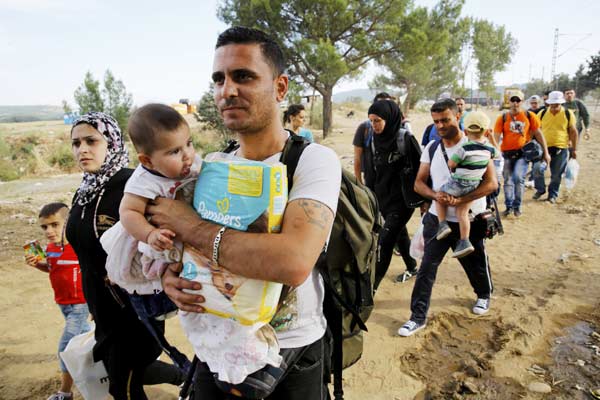 |
|
Syrian refugees walk towards a crossing point at Greece's border with Macedonia, near the Greek village of Idomeni, September 8, 2015. [Photo/Agencies] |
A Vietnamese boat people-like solution will not work with Syrian refugees. In Hong Kong, where I worked in the 1980s and 1990s as a journalist, much was made by the UN High Commissioner for Refugees of the "pull factor", which drove tens of thousands of Vietnamese to take old boats and brave the waves in the South China Sea.
The "pull factor" is best defined as something which persuades people facing appalling hardships, oppression, war or simply economic disaster to take the most unimaginable risks to reach what they see as a haven of safety and hope.
For the Vietnamese boat people who numbered about 2 million, the draw was the US; they had seen the extraordinary largesse of the American troops who fought a bloody but unsuccessful war against communist North Vietnam.
That was the last huge diaspora, that is, until now.
The conflicts in Syria and Iraq have turned tens of thousands of people into refugees, and thousands of them made a beeline for Europe to escape the civil wars and repression.
And here's where the "pull factor" kicks in.
Most of the migrants, interviewed on television, say their stated aim is a new life in Germany. It seems that desire was prompted in part by conversations they had had with relatives who are already living, studying or working there.
Germany's birth rate is dropping, and to boost its already robust economy, it needs fresh migrants, which is probably what prompted Chancellor Angela Merkel to say that her country would welcome refugees from Syria and Iraq.
The route to Germany from Syria and Iraq goes through Turkey, then, in unstable rubber boats across the Aegean Sea to Greece, their first port of call in the European Union. Finally, they cross through Macedonia, Serbia and Hungary before heading across Austria by train to Germany.
But it's all gone horribly wrong. On Tuesday, at midnight, Hungary slammed its gates shut. A 160-kilometer-long steel fence, topped by razor wire, stopped the refugees in their tracks. Violence followed the resultant standoff.
Austria, too, said it was temporarily halting trains to Germany. And in a volte-face, Merkel temporarily imposed strict border controls as officials in Munich said they were facing a humanitarian crisis as they struggled to cope with the influx.
What next? The EU is discussing ways of tackling the crisis at the ministerial level. There is much talk of a quota system, but Eastern European members of the EU say they aren't interested.
Many officials and politicians feel that Merkel's offer to take in refugees wasn't thought through properly. Those dealing with refugees for years say Merkel should have set up some basic screening process at the border of the EU and struck agreements with countries through which the refugees pass before making her announcement.
And here's the difference between the Vietnamese boat people and the present crisis. Despite the hardships they faced, Vietnam was a viable, albeit poor, entity. The UNHCR was able to implement resettlement programs and also negotiate a "voluntary return" scheme, under which the boat people who returned home would not be prosecuted. They got resettlement grants, and the whole process was monitored. By the time China regained sovereignty over Hong Kong, the camps had been cleared.
Syria and Iraq pose a different problem - Syria's towns and cities have been devastated, the government controls less than 30 percent of the country, and Islamic State and other militant groups roam free. There is no one to negotiate with. There will be no going home for many years.
Europe has a major headache.
The author is managing editor of China Daily UK Company. chris@mail.chinadailyuk.com

I’ve lived in China for quite a considerable time including my graduate school years, travelled and worked in a few cities and still choose my destination taking into consideration the density of smog or PM2.5 particulate matter in the region.